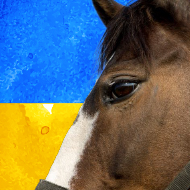BEVA is supplying Ukraine with 10 generators to provide vital power to help care for displaced and injured horses.
BEVA, as part of British Equestrians for Ukraine, is supplying the war-torn country with 10 generators to provide vital power to help care for displaced and injured horses during power cuts. Funds for the generators are being raised through the BEVA Trust’s Power to Ukraine appeal.
The generators cost £1500 each, and have been sourced in Germany. Their journey to Ukraine will be coordinated by a Ukrainian vet who, prior to the war, used to co-ordinate educational conferences in conjunction with the BEVA Trust in Kyiv.
The war in Ukraine is now coming up to its first anniversary and winter is proving hard for people and animals alike. With temperatures regularly reaching lows of minus 15 and the additional challenge of enforced power cuts, providing even basic care for horses has been difficult and emergency veterinary care almost impossible.
Alison Talbot, BEVA Council Member and project leader said: “Power cuts forced on entire communities make daily care for displaced and injured horses even more difficult. During the power cuts the vets, owners and carers of these horses are not only deprived of light but also hot water, equipment and sustenance, making emergency and even day-to-day veterinary care almost impossible.
“Most equine vets and horse owners have been in the situation of muddy fields, no light and no power and can sympathise on this basic level. But add to the struggle the dodging of shelling and the difficulty of communicating when there is no means of charging digital equipment and the situation is even more desperate.”




 The RCVS has announced a new version of its 1CPD mobile app, with enhanced features for veterinary surgeons and veterinary nurses to record their continuing professional development.
The RCVS has announced a new version of its 1CPD mobile app, with enhanced features for veterinary surgeons and veterinary nurses to record their continuing professional development.